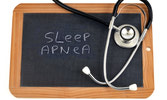There are three different types of sleep apnea; obstructive sleep apnea, central sleep apnea, and complex sleep apnea. Understanding the different types and their symptoms will help you recognize symptoms in yourself and loved ones. If you or someone you know is experiencing symptoms of any type of sleep apnea, it is crucial to seek medical care to receive a correct diagnosis and treatment. Continue reading to find out more about the signs and symptoms of the three different types of sleep apnea.
Obstructive Sleep Apnea
Obstructive sleep apnea is the most common form of sleep apnea, and it involves an obstruction in the mouth or throat while asleep. The muscles in the back of the throat collapse and obstruct the airway, making breathing difficult. This blockage in the airway can cause the brain to wake the person up because it can sense that you are not receiving enough oxygen. These abrupt awakenings throughout the night can affect the quality of sleep a person is getting each night, which can lead to sleep deprivation and other health problems.
Symptoms:
- Waking up with a dry mouth
- Snoring
- Gasping for air while asleep
- Headaches
- Difficulty concentrating throughout the day
Central Sleep Apnea
Unlike obstructive sleep apnea, central sleep apnea is caused by a neurological problem and does not involve an obstruction. With central sleep apnea, the brain and nervous system fail to send the correct signals needed in order to breathe, which causes breathing to start and stop again throughout the night. This type of sleep apnea is less common than obstructive sleep apnea and is more difficult to diagnose. Causes of central sleep apnea include heart failure, certain drugs, including opioids and benzodiazepines, low blood oxygen levels, and damage to the nervous system.
Symptoms:
- Insomnia
- Shortness of breath when waking up
- Tiredness
- Abnormal breathing while asleep
- Difficulty concentrating
- Snoring (can occur but more commonly found in obstructive sleep apnea)
Complex Sleep Apnea
This type of sleep apnea occurs when a person is experiencing both obstructive sleep apnea and central sleep apnea. Complex sleep apnea is the least common form of sleep apnea and individuals who have this will experience symptoms of both obstructive and central sleep apnea.
If you or a loved one are experiencing any sleep apnea symptoms, our team at PulseAir can help you! We help with diagnosis, education, and treatment of sleep apnea. To learn more about our available services, visit our website or contact our team to get started!


